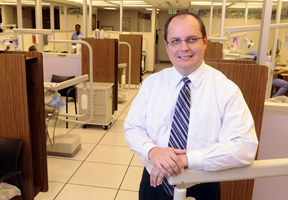After Roy Hager and Mike Merrill heard a moving story about a group of teenage girls from the Republic of Moldova at Frazer Memorial Methodist Church in Montgomery one Sunday this past summer, they felt compelled to help.
 |
| A collaboration among UAB optometrists, ophthalmologists and dentists, including associate professor Stephen Mitchell and several of his dentistry students, resulted in free eye care, free glasses and a free dental checkup for several teenage girls from the Republic of Moldova. |
From those conversations grew a collaboration between Ophthalmology and the UAB School of Dentistry that resulted in free eye care, free glasses and a free dental checkup for several of the girls.
“The girls were very grateful for everything that was done for them,” Merrill says. “I think they were somewhat overwhelmed that so many people would try to help them as they did.
“You have to remember these girls never had anything in the way of material possessions — nothing. Their backgrounds were pretty rough.”
Philip Cameron Ministries brought the girls from their Eastern European home to the United States for possible adoption. It likely saved them from the sex-slave trade of their area. The girls all had tragic childhood stories. One witnessed her father kill her mother with a machete. Another girl’s father offered to sell her for $3,500. A third girl was held back in the sixth grade for four years because it was thought she had a learning disability when what she actually needed was a pair of eye glasses.
“Many of these girls were put in an orphanage because their parents didn’t want them,” Hager says. “All of their stories shocked me. The girl held back in the sixth grade for so long because they didn’t know she had trouble with her eyes got to me, mostly because that’s what I do.
“I told Mike we didn’t need to ever let something like that happen again. We will always do eye exams from now on with these girls when they are brought to the United States and do whatever else they need.”
Hager, an ophthalmologist at ITEC in Montgomery along with Charles Robbins, provided free eye exams to each of the girls. They found that several of the girls needed glasses. One of the girls was blind in one eye solely because she did not receive the proper eye care she needed as a young child, Hager says. Another was diagnosed borderline glaucoma and will be examined by Hager again next year when she comes back to the United States.
“Many of their problems are things we see in our practice every day,” Hager says. “When you’re a child, you don’t know what you’re supposed to see. You think whatever you see is what everybody sees. When situations like that arise here, the school sends a note home that says they don’t think a child can see very well and need to get their eyes checked. These girls just never had that opportunity.”
Providing care
The Alabama Academy of Ophthalmology has a community-outreach program called EyeCare Alabama. UAB’s Department of Ophthalmology frequently provides resources for the outreach, which provides free services to disadvantaged Alabamians.
This situation did not fit into the normal scope of the academy’s mission, but Merrill says the organization felt a responsibility to help the girls. “We had to help these young ladies because it was just the right thing to do,” he says.
Merrill contacted Research Professor Mary Jean Sanspree, Ph.D., in the School of Optometry who provided glasses to the girls who needed them. Knox then contacted Sommer Mackin, major gifts officer in the School of Dentistry, on behalf of Merrill to gauge that school’s interest in providing care for the girls. Mackin approached Dean Huw Thomas, Ph.D., about the outreach project, and they immediately agreed to help.
The girls came to Birmingham and were treated by Assistant Professor Steve Mitchell, D.M.D., and several of his students.
“Dean Thomas called to see if we could do anything to help, and I said certainly,” Mitchell says. “I didn’t know much about it, just knew they were from somewhere called Moldova. I didn’t even know where that was.
“I was on my way home from an off-campus clinic the day we agreed to do it and I was listing to the replay of the ‘Rick and Bubba Show’ on the radio and they were talking about these girls,” he says. “I got filled in on the way home after we had already agreed to help.”
Mitchell says opportunities like these are an important part of learning for his students.
“If our students are going to graduate and become professionals who understand they have an obligation to take care of those less fortunate, then they’ve got to have a chance to see it firsthand while they’re in school,” Mitchell says. “From an educator’s perspective, that’s one reason these are extremely valuable opportunities — to enable our students to see the kind of impact they can have firsthand.”
All but two of the girls have returned to Moldova. The Alabama Academy of Ophthalmology is trying to secure permanent visas so all of the girls can return to the United States forever, but they need legal and political guidance. They also are trying to purchase a van to help with transportation.
To learn more or offer assistance, contact Merrill at jmikemerrill@gmail.com or 334-279-9755.